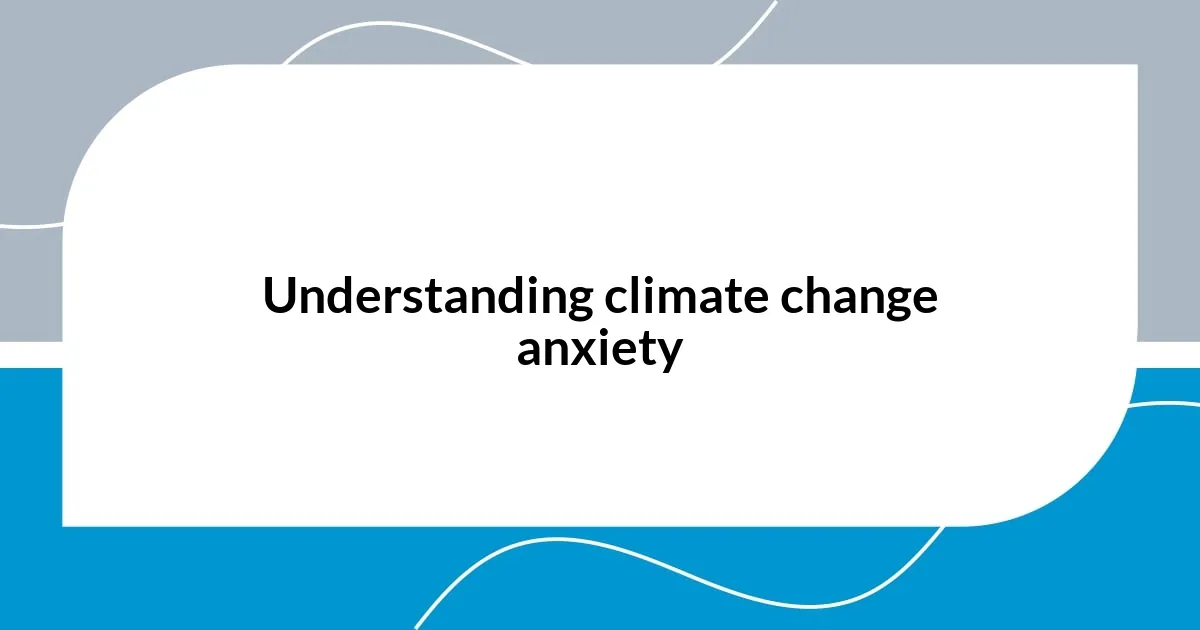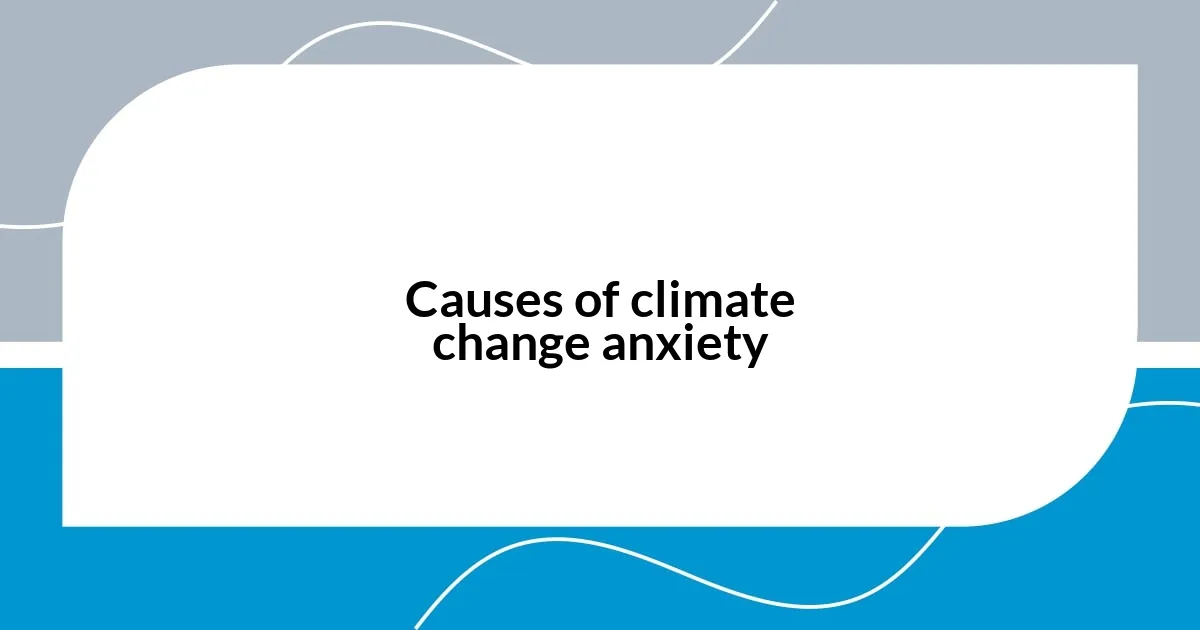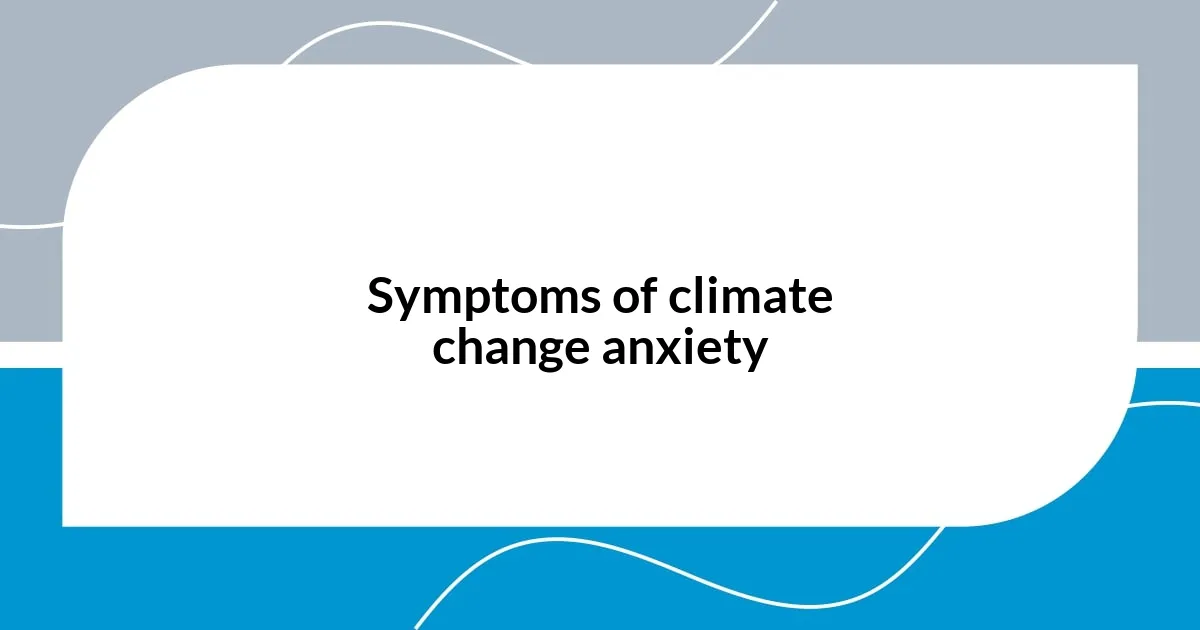Key takeaways:
- Climate change anxiety is a prevalent emotional reaction driven by both environmental awareness and concerns for the future.
- Key causes include media saturation, uncertainty about the future, inadequate responses, and personal connection to local environmental changes.
- Symptoms manifest in physical and emotional ways, such as feelings of dread, sleeplessness, and fatigue, impacting overall mental well-being.
- Discussion and vulnerability with others can transform anxiety into constructive conversations and actions regarding climate change.

Understanding climate change anxiety
Climate change anxiety is a real emotional response many of us experience as we grapple with the overwhelming scale of environmental challenges. I remember feeling that knot in my stomach while watching news reports on rising sea levels—was our home going to disappear? It’s a feeling that seems almost constant, doesn’t it?
As I talk to friends and family about these concerns, I often find we share a mix of frustration and sadness. One evening, a friend shared her fear about her children’s future, echoing thoughts I also had. It’s unsettling to realize that this anxiety often stems from not only the facts we see but from a deep-seated worry about inaction. How can we balance our desire to be informed while still protecting our mental health?
In a world where climate changes are becoming more visible, such anxieties become even harder to ignore. I’ve found that acknowledging this discomfort is crucial. Instead of brushing it aside, I’ve learned that discussing our feelings with others—whether in a supportive group or just with a close friend—can transform our anxiety into actionable conversations about what we can do. Isn’t it interesting how vulnerability can lead to empowerment?

Causes of climate change anxiety
Anxiety about climate change often springs from the awareness of its profound impact on our lives and our environment. I recall a weekend hike where the air felt unusually still and thick—suddenly, I was keenly aware of the smog that was too often masked by the beauty of nature. It’s moments like these that make the statistics feel not just abstract numbers but looming realities. The knowledge that climate crises are affecting weather patterns, biodiversity, and even public health adds an additional weight to our daily lives.
Several factors contribute to this anxiety:
- Media Saturation: Constant exposure to alarming news can create a sense of helplessness.
- Uncertainty of the Future: Concerns about job security, resource availability, and livability for future generations can amplify worries.
- Inadequate Responses: Watching governments and organizations seem to fall short in addressing climate change can lead to frustration and despair.
- Personal Connection: When our local environments are impacted, it shifts climate change from being a distant issue to a personal crisis.
I remember last summer when wildfires devastated regions close to home; the acrid scent of smoke in the air felt like a direct attack on my sense of safety. For me, those experiences reinforced the emotional whirlwind of fear and grief, making the abstract very real and personal.

Symptoms of climate change anxiety
I’ve noticed that the symptoms of climate change anxiety can vary widely but often present themselves in deeply emotional ways. For me, it sometimes feels like a palpable heaviness in my chest, especially during conversations about extreme weather events. Can you relate to that feeling of dread when you hear about another natural disaster? It’s as if my body instinctively reacts to the sheer volume of devastation.
Additionally, sleepless nights have become a familiar companion. I can’t tell you how many times I’ve laid awake, my mind racing with thoughts of ice caps melting and species facing extinction. I often wonder: how do we live day-to-day when the bigger picture feels so grim? This kind of persistent worry can lead to irritability and fatigue, making it hard to focus on anything else.
One particularly vivid moment for me was last winter, when the air felt especially heavy, thick with anxiety about the climate collapse. I was out with friends, and all I could do was connect the casual conversation back to ecological loss. I couldn’t shake off the overwhelming sense of sadness. Has something similar ever happened to you? It’s an exhausting cycle that makes enjoying life feel like a challenge when the shadow of climate change looms so large. It’s a constant reminder that while we work to protect our planet, we also need to safeguard our mental well-being.